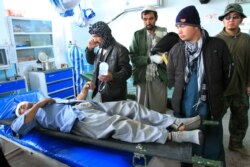America’s chief negotiator for peace in Afghanistan, Zalmay Khalilzad, visited Pakistan on Friday, a day after he briefly suspended peace talks with the Taliban in Qatar in retaliation to this week’s attack by the insurgent group on the largest U.S. military base in Afghanistan.
Khalilzad met Foreign Minister Shah Mehmood Qureshi in Islamabad and briefed him on the U.S.-Taliban discussions in the Qatari capital of Doha, said a Pakistani statement.
“We hope the U.S.-Taliban negotiations will resume soon,” Qureshi was quoted as saying, apparently in reference to the disrupted talks that had only recently restarted.
Qureshi reaffirmed Pakistan’s resolve to continue to play its “facilitating" role in the Afghan peace process and emphasized again the conflict in the neighboring country had no military solution.
Khalilzad later met with Pakistani military chief General Qamar Javed Bajwa in the neighboring city of Rawalpindi where the army is headquartered. “Regional security situation with particular reference to (the) ongoing Afghan reconciliation process was discussed,” the army spokesman said.
Taliban leaders maintain close contacts with Islamabad, and their families also live in Pakistan among nearly three million Afghan refugees the country still hosts.
Taliban attacks
Wednesday’s suicide car bomb-and-gun attack on the Bagram base mostly caused Afghan civilian casualties in nearby civilian localities and did not harm U.S. and NATO forces.
The Taliban swiftly took credit for staging the assault.
“When I met the Talibs today, I expressed outrage about yesterday’s attack on Bagram, which recklessly killed two and wounded dozens of civilians. (The) Taliban must show they are willing & able to respond to Afghan desire for peace,” Khalilzad tweeted Thursday after his meeting with insurgent negotiators.
“We're taking a brief pause for them to consult their leadership on this essential topic,” the Afghan-born U.S. envoy emphasized.
Hours earlier, Taliban spokesman Suhail Shaheen in a his tweet insisted the two sides wrapped up nearly a week of peace negotiations in a “good and positive” atmosphere, and with an agreement to resume the talks after “a few days and internal consultations.”
The disruption in the talks comes as a roadside bomb Friday ripped through a minivan in the eastern Ghazni province, killing at least ten civilians. There were no immediate claims of responsibility for the bombing in the province, the site of almost daily clashes between Taliban insurgents and Afghan security forces.
Negotiations
The negotiations restarted last Saturday, three months after President Donald Trump abruptly suspended the process, citing increased insurgent attacks in the Afghan capital of Kabul that killed an American soldier, among others.
Insurgent sources said that in the meetings in Qatar over the past six days, Khalilzad and his team pressed the Taliban to reduce violence or declare a cease-fire and enter into intra-Afghan negotiations aimed at finding a political settlement to the war.
Khalilzad is trying to seal a U.S.-Taliban agreement that would lead to Afghan-Taliban negotiations to permanently end decades of hostilities and enable all international forces to leave the country.
Shaheen stated again earlier this week that once a troop-withdrawal agreement is signed between the Taliban and the U.S., insurgents would observe a cease-fire with U.S. and NATO forces to facilitate their departure. A nationwide cease-fire with Afghan security forces, he said, would be on the agenda when Afghan-Taliban negotiations begin.






